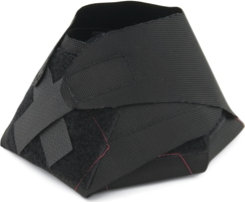J.K. wrote to ask about an old article I wrote about Discipline your horse, as opposed to Correcting your horse,....."I remember reading an article you wrote about disciplining being the harsher side of training. While I don't ride much anymore, I was having a debate with my friend about horses being like children, neither doing well, in general, with disciplining. Can you send me or re-post that article? Thanks, I found your site enjoyable and informative."
That older article you mention was titled - "Correcting Your Horse Versus Disciplining Your Horse " - and is available here. I had a hard time writing that as I do writing this, as one person's discipline is another's punishment. We define things in order to communicate better with each other, but some terms just have very broad meanings across a group of people. Consider the phrase "breaking a horse". Many people, who in the best forms of "natural horsemanship", still use this term when what they do with, and how they train horses is anything but breaking them. I think the frame of mind and the methods used by each individual define what they are doing.
Discipline connotes some sort of consequence, usually punishment, for what a horse or a person did wrong - or a different way of looking at it - what they didn't do right. I also call this negative re-enforcement training. An example may be lunging your horse and whipping it on the butt when the horse isn't transitioning into the gait you want. An example for people may be a football coach making one of the players do sprints up and down the football field for executing plays incorrectly. Negative re-enforcement often creates resentment, anxiety and fear of trying. Horses can be fearful enough that when we burden them with punishment it usually has the opposite effect we were seeking. Took me a long time to understand this much to my shame.
Correction implies fixing something that wasn't done correctly. It likely can't be done with recognizing or rewarding what was done right, but focuses on fixing what was done wrong or wasn't done completely right. This would be positive re-enforcement. Maybe you're trying to get a horse to soften his face, asking him to drop his head and tuck his nose. Once he drops his head or maybe just tucks his nose slightly, you release the rein pressure you were using, and you rub on him and let him stand quiet for a moment, before asking again. This is also what is meant by "rewarding the slightest try", a phrase that came out of the horse training methods of Tom Dorrance and Ray Hunt.
A human example of positive re-enforcement would be teaching someone to double a horse but they consistently are pulling back on the reins affecting the horse's ability to bring his front end over in the turn. So first concentrating on what they are doing right, maybe you comment on how well their seat and balance are, then you say "you may get your horse bringing his front end over smoother if you put your hands a bit more forward and give him more slack in the rein that becomes your outside rein.
I think what patience and correction is, as opposed to discipline and punishment, is one of the foundations for what most people refer to natural horsemanship and what is attributed to the methods of horsemanship brought to light, again, by Tom Dorrance and Ray Hunt and continued by many exceptional clinicians today. Although, I also think if you ask 20 people what natural horsemanship is you'll get 30 different answers....such is the difficulty in defining these terms like this as well as concepts of discipline and correction. They just mean different things to different people.
But, I wouldn't worry about what they mean to others. What it means to you and how you use it is what is important. Speaking about the difficulties in defining terms, you may like this article, called "The Myth of Natural Horsemanship", which is a chapter in book by Tom Moates called "A Horse's Thought - a Journey Into Honest Horsemanship". It is an exceptionally well written article and is thought provoking. For a man like me, who some - like my wife - call dim witted, this article is challenging.
Good luck J.K. I think you are approaching horses from a good angle when you say they re like children. A firm hand and correction as opposed to a heavy hand and discipline will likely be a safer and happier journey.



















No comments:
Post a Comment